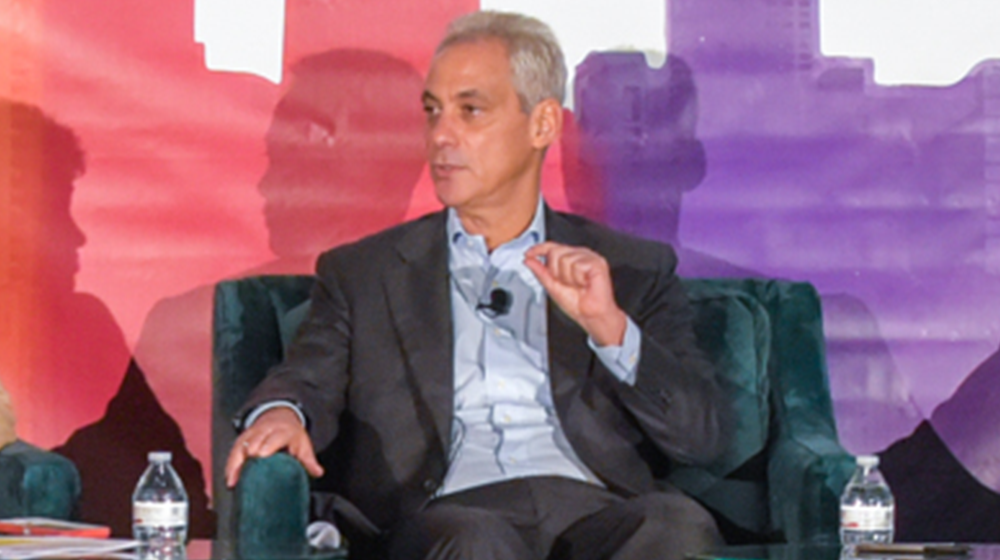Chicago leaders make case for inclusivity

Rahm Emmanuel addresses the Inclusion + Innovation Summit, co-hosted by Comcast NBCUniversal and the Baumhart Center.
By Brittany Grosser-Basile | Student reporter
Executives from all sectors of the Chicago economy came together on October 2nd at the Inclusion + Innovation Summit, co-hosted by Comcast NBCUniversal and the Baumhart Center. Over the daylong summit, leaders explored how inclusivity can drive Chicago’s ongoing evolution as a global city.
The day was filled with a mix of interactive panels and workshops that featured 25 speakers, including Chicago Mayor Rahm Emmanuel, Comcast Senior EVP and Chief Diversity Officer David L. Cohen, Loyola University Chicago President Jo Ann Rooney, and National Urban League President Marc Morial. Across the day’s exchanges, three themes emerged.
Inclusion is essential to a thriving Chicago
Emmanuel spoke passionately about inclusion as essential to building the Chicago we want it to be. “Our skyline is the image of our city to the world, and the image of us back to ourselves,” Emmanuel said. “If a child walking out of their front door of their home or school in Ravenswood looks at the city and a child in Roseland on the other side of town looks at the city, if they both say that’s Chicago, that’s my home: game on, we win… If they have the same perspective on the city, meaning we have one city where everybody feels this is their city and it includes them, we will have succeeded beyond our wildest imagination.”
Inclusion requires intention and commitment
Rooney talked about Loyola University Chicago’s commitment to inclusion, sharing the powerful model vision behind Loyola’s Arrupe College. Rooney said that the University sought to be accessible to all Chicagoans and so it designed this new college within the University to support students with limited financial resources to achieve a post-secondary degree with little or no debt.
Morial reinforced Rooney’s message, speaking to the need for businesses to develop explicit strategies to ensure inclusion. “This work has to be a strategic business focus, like customer satisfaction and profitability,” Morial said. “There is an obligation and a duty not only to shareholders, but also an obligation to a broad range of stakeholders who form the customer base, the employee base, the future employee base.”
Inclusion needs a champion
Cohen spoke passionately about the importance of executives at the highest-level owning inclusion as a core part of their role. Indeed, he asked to be the Chief Diversity Officer amidst his already robust responsibilities at Comcast because he wanted to ensure the inclusive principles and comprehensive diversity strategies are embedded throughout the company. This sustained, high level commitment has made a real difference for Comcast, positioning the company as a recognized leader in diversity across every level of the organization – in its board composition, its staff leadership, and even its on-air talent. “Not only is this work good for business, it’s good for the soul. It is morally right,” Cohen said.
By Brittany Grosser-Basile | Student reporter
Executives from all sectors of the Chicago economy came together on October 2nd at the Inclusion + Innovation Summit, co-hosted by Comcast NBCUniversal and the Baumhart Center. Over the daylong summit, leaders explored how inclusivity can drive Chicago’s ongoing evolution as a global city.
The day was filled with a mix of interactive panels and workshops that featured 25 speakers, including Chicago Mayor Rahm Emmanuel, Comcast Senior EVP and Chief Diversity Officer David L. Cohen, Loyola University Chicago President Jo Ann Rooney, and National Urban League President Marc Morial. Across the day’s exchanges, three themes emerged.
Inclusion is essential to a thriving Chicago
Emmanuel spoke passionately about inclusion as essential to building the Chicago we want it to be. “Our skyline is the image of our city to the world, and the image of us back to ourselves,” Emmanuel said. “If a child walking out of their front door of their home or school in Ravenswood looks at the city and a child in Roseland on the other side of town looks at the city, if they both say that’s Chicago, that’s my home: game on, we win… If they have the same perspective on the city, meaning we have one city where everybody feels this is their city and it includes them, we will have succeeded beyond our wildest imagination.”
Inclusion requires intention and commitment
Rooney talked about Loyola University Chicago’s commitment to inclusion, sharing the powerful model vision behind Loyola’s Arrupe College. Rooney said that the University sought to be accessible to all Chicagoans and so it designed this new college within the University to support students with limited financial resources to achieve a post-secondary degree with little or no debt.
Morial reinforced Rooney’s message, speaking to the need for businesses to develop explicit strategies to ensure inclusion. “This work has to be a strategic business focus, like customer satisfaction and profitability,” Morial said. “There is an obligation and a duty not only to shareholders, but also an obligation to a broad range of stakeholders who form the customer base, the employee base, the future employee base.”
Inclusion needs a champion
Cohen spoke passionately about the importance of executives at the highest-level owning inclusion as a core part of their role. Indeed, he asked to be the Chief Diversity Officer amidst his already robust responsibilities at Comcast because he wanted to ensure the inclusive principles and comprehensive diversity strategies are embedded throughout the company. This sustained, high level commitment has made a real difference for Comcast, positioning the company as a recognized leader in diversity across every level of the organization – in its board composition, its staff leadership, and even its on-air talent. “Not only is this work good for business, it’s good for the soul. It is morally right,” Cohen said.
